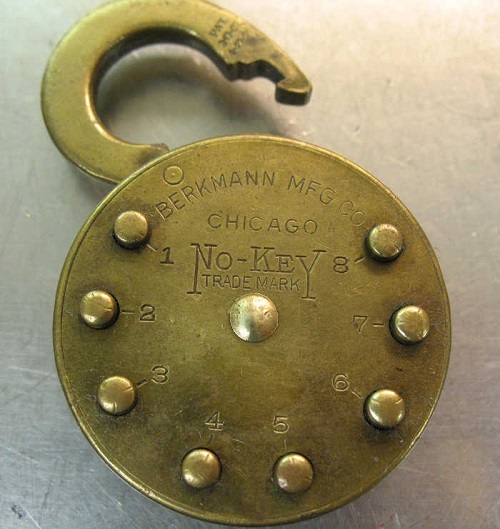FWP:
SETS == GENERATORS;
POETRY; SYMMETRY
BONDAGE: {1,5}
This is the kind of verse I call a 'generator', because it can be put together in such a remarkable number of very different ways. Here are some of the main ones for the first line:
=The happiness of a suitable, pre-destinedly 'bound, connected' poetic temperament depends upon its being pledged to poetry.
=The happiness of a melancholy, 'bound' and constrained , temperament depends upon its being pledged to poetry.
=The melancholy temperament's (chance of) happiness has been, in the speaker's case, pledged or pawned for the sake of poetry (and thus lost to me).
And for the second line:
=The enchanted-world of the combination lock was a school-room to the speaker, because it taught him a positive lesson: that the right set of letters and words can achieve a sudden, powerful, magic effect.
=The enchanted-world of the combination lock was a school-room to the speaker, because it taught him a negative lesson: that in the very act of successful operation the instant result is separation and isolation of the formerly united parts of the lock (as in {48,2}).
=The school-room was the enchanted-world of a combination lock to the speaker, because it taught him a positive lesson: that one who learns the right set of letters and words can achieve a 'magic' poetic effect.
=The school-room was the enchanted-world of a combination lock to the speaker, because it taught him a negative lesson: that no amount of learning of mere letters and words can succeed unless one somehow has special 'magic' access to the predestined opening formula.
All these excellent and fascinating ambiguities-- and more besides, if you care to generate some-- are created by the juxtaposition of a number of extremely suggestive metaphorical words: 'pledged', 'poetry', 'enchanted-world', 'combination lock', 'school-room'. Each of these words has nuances and associations that spin out in a number of possible directions, from the cheerful and affirmative to the bleak and negative (see the definitions above).
Moreover, they're joined by the vaguest and most minimal grammatical links: 'is', 'was', dar , and a few i.zaafat constructions. In the second line in particular, 'A was the B of C' (or equally 'the B of C was A') can go in so many directions! And as so often, needless to say, we're left to decide for ourselves exactly how the two lines are to be connected to each other. Additionally, the 'to me' suggests the further qualification that the speaker might be totally wrong about everything, and all these notions were simply generated by his madness or despair.
As Faruqi observes, the wordplay (and meaning-play too of course) in this verse is also astonishing. He makes the point about the multiply appropriate double meaning of dar as 'door, gate'. Then, we have the 'opening' [kushaad] of a 'bound' [vaa-bastah] temperament (and the vaa in vaa-bastah , if taken in isolation, means 'open'). We have an 'enchanted-world' [:tilism] (translated this way to avoid the ambiguities of the English word 'enchantment') that is, in the stories of Amir Hamzah and other such dastans, very difficult to 'open' and enter-- and all but impossible to get out of once you are 'closed' inside it (unless you are the predestined breaker of the enchantment). We have a combination lock that, when its dials are aligned so that the mechanism meshes or 'closes' on itself most perfectly, instantly 'opens'. We have a school-room, a 'closed' world into which children may go reluctantly, but which may 'open' out before them a new world of knowledge.
Thank you, all my teachers in many 'school-rooms', for making
it possible for me to have poetry like this in my life, and thank you, Ghalib,
for 'opening' to us such magic worlds.

Nazm:
He says, it's as if my school was the enchantment of a combination lock, or a factory in which combination locks are cast, so that in my heart, from the effect of that school, a combination-lock chamber has grown up. Thus it always remains closed, and if it ever opens, then it's through poetry. The way when the letters of the setting of a combination lock are dialed it successfully clicks and opens, and until that is done the lock remains closed....
In the structure too of this verse Persianness has disproportionately prevailed; the i.zaafat constructions don't seem so bad, but the one word dar has greatly intruded into the simplicity of the verse. But one excuse on the author's side is well warranted: that Persianness had become so prevailing [;Gaalib] over him that he no longer distinguished between Urdu and Persian. (228)
== Nazm page 228